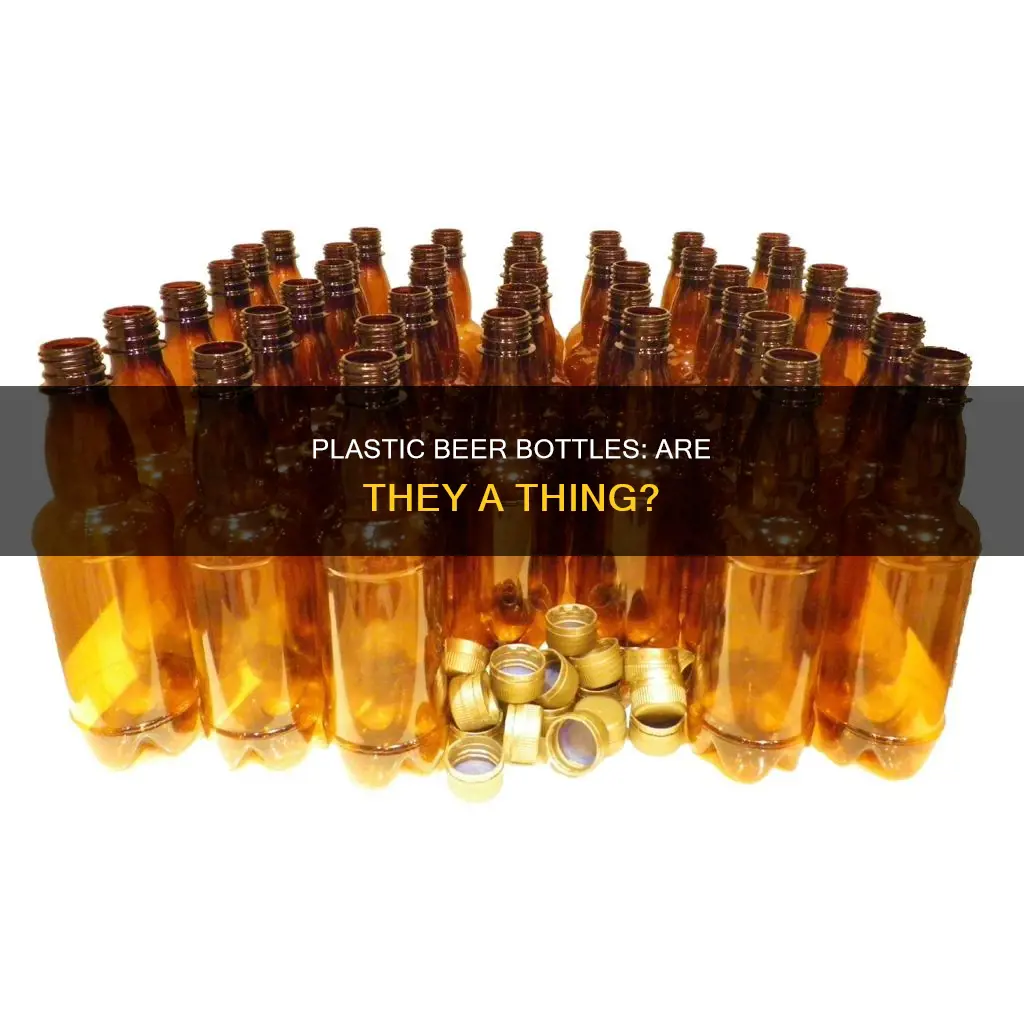
Beer is rarely sold in plastic bottles, especially in the United States, where the most common containers are glass bottles and aluminium cans. However, in other parts of the world, such as Germany, Finland, the Czech Republic, Poland, South Korea, Norway, and Ukraine, beer is more commonly packaged in plastic bottles.
There are several reasons why beer is not typically sold in plastic bottles. Firstly, beer tends to lose its carbonation and become stale in plastic bottles due to the molecular structure of plastics, which is not effective at keeping carbonation in or oxygen out. Additionally, beer is more susceptible to going skunky if it is not stored in a light-filtering bottle, and light-filtering plastic bottles are harder to recycle and more expensive to produce than their glass or aluminium counterparts.
Another factor is the perception of plastic packaging. Many brewers believe that plastic bottles are seen as an inferior package that may tarnish the brand image of the beer, both from a quality and sustainability perspective.
However, there are some instances where beer is sold in plastic bottles, such as at sporting events or concert venues where glass is not allowed, or during the summer months in parks that do not allow glass bottles.
| Characteristics | Values |
|---|---|
| Beer sold in plastic bottles | Beer is rarely sold in plastic bottles in the US |
| In other parts of the world, beer is more commonly packaged in plastic bottles | |
| Reasons for not using plastic bottles | Beer loses its carbonation and becomes stale in plastic bottles |
| Beer is more susceptible to going "skunky" if it's not stored in a light-filtering bottle | |
| Light-filtering plastic bottles are harder to recycle and more expensive to produce than cans or glass bottles | |
| Plastic bottles are seen as an "inferior package" that may tarnish the perception of the beer | |
| Occasions when beer is sold in plastic bottles | Beer is often packaged in plastic bottles at sporting events, concert venues, or places where glass might not be allowed |
What You'll Learn

Beer loses carbonation and goes stale in plastic bottles
Beer is rarely sold in plastic bottles. The most common containers for beer are glass bottles and aluminium cans. This is because beer tends to lose its carbonation and become stale in plastic bottles. According to Chuck Skypeck, the director of technical brewing projects at the Brewers Association, the molecular structure of most plastics is not good at keeping carbonation in the package/product or keeping oxygen out to prevent staling.
Plastics are also not good at preventing beer from going "skunky". This happens when beer is exposed to light, and light-filtering plastic bottles have not yet been widely adopted. Plastic bottles may also be harder to recycle and more expensive to produce than glass bottles or aluminium cans.
Some people also believe that plastic bottles are seen as an ""inferior package" that may tarnish the perception of the beer. Using plastic packaging can damage a brewer's brand image both from a quality perspective and a sustainability perspective.
However, in some parts of the world, certain beers are commonly packaged in plastic bottles, and even in the United States, beer is sometimes packaged in plastic bottles for sale at sporting events, concert venues, or places where glass might not be allowed.
Where to Buy Double Diamond Beer Today?
You may want to see also

Plastic bottles are more susceptible to oxygen ingress
The permeability of plastic bottles to oxygen depends on the type of plastic and the thickness of the bottle. For example, polyethylene terephthalate (PET) bottles are made with passive barrier layers to reduce oxygen ingress, or they can be manufactured from polymers with lower oxygen permeability. However, even with these measures, PET bottles are still more susceptible to oxygen ingress than glass bottles.
In addition to being more susceptible to oxygen ingress, plastic bottles also tend to cause beer to lose its carbonation and go flat more quickly than glass bottles. This is because the molecular structure of most plastics is not as effective at keeping carbonation in the bottle.
For these reasons, plastic bottles are generally not a good packaging choice for beer, and beer is rarely sold in plastic bottles, especially in the United States. Glass bottles and aluminium cans are the most common packaging choices for beer, as they are superior at maintaining the freshness and carbonation levels intended by the brewer.
Buying Beer in Iran: What's the Deal?
You may want to see also

Plastic bottles are harder to recycle and more expensive to produce
The process of recycling plastic is labour-intensive and expensive. Plastic products often contain a variety of additives, such as fillers, reinforcements and colourants. When it comes to recycling, different kinds of plastic cannot be combined. For example, even very small amounts of PVC can significantly degrade PET plastic. Sorting and separating the different types of plastic is challenging and costly.
In addition, there are often complications involved in isolating the material to be recycled, depending on the product and the waste mixed in with the plastic. For instance, plastic bottles may contain residues of the product they were carrying, such as shampoo or soda, which need to be removed during the recycling process.
By contrast, extracting oil from the ground and using it to produce new plastic is a simpler process with a well-established production and distribution system. As a result, the economic incentive is to produce new plastic rather than recycle old plastic.
On top of this, plastic bottles are harder to recycle than other materials. For example, glass bottles can be washed in a dishwasher, whereas commercial soda bottles are thin-walled and will deteriorate over time in sunlight or with heat treatment.
Plastic bottles are also more expensive to produce than glass or aluminium bottles. This is because the price of oil, which is the main ingredient in plastic, is high. In addition, producing plastic bottles requires more oil than producing glass or aluminium bottles. This is because transporting plastic bottles requires more oil due to their greater weight.
Overall, while it is possible to recycle plastic bottles, it is more difficult and costly than recycling other materials. It is also more expensive to produce plastic bottles compared to glass or aluminium bottles due to the high price of oil.
Buying Beer in Ohio: Thanksgiving Shopping Rules
You may want to see also

Plastic bottles are perceived as inferior packaging
In addition to the technical limitations of plastic bottles, there is also a perception issue. Many brewers believe that plastic bottles are seen as an "inferior package" that may tarnish the perception of the beer and the brand. Consumers tend to associate plastic packaging with cheapness and inferior quality. This perception is driven by consumers' beliefs that "paper is good, plastic is bad", and that plastic is unnatural and harmful to the environment.
Furthermore, plastic packaging is often associated with products of lower quality. For example, in the United States, beer sold in plastic bottles is often associated with cheap, mass-market brands or with venues where glass is prohibited, such as sporting events or concert venues.
Finally, plastic packaging is often less aesthetically pleasing than glass or aluminium cans. This may be particularly important for craft beers or premium brands that want to convey a certain image or lifestyle through their packaging.
Beer Fest Tickets: Door Sales or Advance Purchase?
You may want to see also

Plastic bottles are not allowed in some outdoor settings
However, it is worth noting that the use of plastic bottles for beer is not common, even in settings where glass is permitted. This is mainly because beer tends to lose carbonation and go stale faster in plastic bottles compared to glass or aluminium. Additionally, beer is more susceptible to spoilage if not stored in a light-filtering bottle, and light-filtering plastic bottles are not yet widely available.
The preference for glass or aluminium bottles over plastic may also be influenced by consumer perception. Some brewers believe that packaging their beer in plastic bottles could be seen as an "inferior package," potentially damaging their brand image and suggesting lower-quality or less sustainable practices. As a result, beer is predominantly sold in glass bottles or aluminium cans, with plastic bottles being a rare option in the beer aisle.
While plastic bottles may not be ideal for beer due to carbonation and spoilage issues, they can still be used for home brewing or in specific circumstances where glass is prohibited. In these cases, it is important to choose plastic bottles that are strong enough to withstand pressure and to store the beer in a dark place to prevent light exposure.
Best Places to Buy Abita Root Beer
You may want to see also
Frequently asked questions
Yes, you can buy beer in plastic bottles, but it is rare. In the US, beer is usually sold in glass bottles or aluminium cans.
Beer tends to lose its carbonation and go flat in plastic bottles. Plastic is also more susceptible to letting in oxygen, which can make beer go "skunky". Plastic bottles are also harder to recycle and can be more expensive to produce than glass or aluminium.
Beer in plastic bottles is more common in certain parts of the world, including Eastern Europe and South Korea. In the US, beer is sometimes packaged in plastic bottles for sale at sporting events or concert venues where glass might not be allowed.
Plastic bottles are lighter and less breakable than glass, which can make them more convenient for outdoor activities.
In addition to potentially affecting the taste of the beer, plastic bottles can also leach chemicals such as antimony and bromine, which can be harmful to human health.







